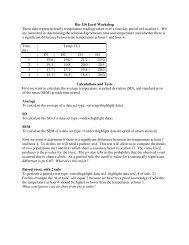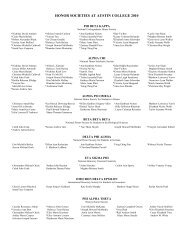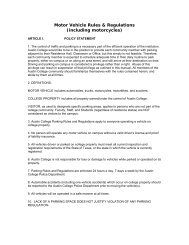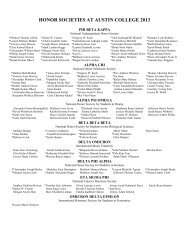Create successful ePaper yourself
Turn your PDF publications into a flip-book with our unique Google optimized e-Paper software.
ENVIRONMENTAL STUDIESStudents who plan to major in environmentalstudies should select electivecourses for the major that are bestsuited to their particular interests andshould choose a minor (or secondmajor) that best complements theirinterests in environmental studies. Thedirector must approve any courses thatare not included in the above list.The director must approve the experientiallearning activity that servesas the required project for the major.Possible formats include a directedstudy, independent study, honors thesis,or one of the various non-creditformats such as an internship or summerresearch position. Junior status isa prerequisite for project approval. Thedirector must approve written projectplans 12 months before graduation.Upon completion, students describetheir projects in public presentations tothe campus community. Environmentalstudies majors whose approved projectwill not result in course credit (e.g. asummer internship, service work, orsummer research job) should registerfor Environmental Studies 480 duringthe semester that they will give thepublic presentation on their project.A minor in environmental studiesnormally consists of five course credits,including Environmental Studies 235and 479, and three other approvedcourses from at least two of the college’sdivisions (humanities, natural sciences,social sciences). The minor must includeat least two courses from the followinglist. Pre-approval from the director is requiredto substitute any course not listed.BIOL 334BIOL 350ECON 242PHIL 307PHY 240EcologyEcosystem EcologyNatural Resources andEnvironmental EconomicsEnvironmental EthicsAtmospheric andEnvironmental Physics235 Introduction toEnvironmental StudiesAn introduction to and framework for evaluatingenvironmental issues such as biodiversityloss, global climate change, stratospheric ozonedepletion, degradation of fertile soils, renewableand nonrenewable resource utilization, andaquifer depletion. (Usually each fall and spring)250 Topics in Environmental StudiesAn investigation of selected topics and issuesconcerning environmental studies. May berepeated when topic varies. (Offered on anoccasional basis)260 Intermediate Directed Study(Variable course credit)350, 450 Advanced Topics inEnvironmental Studies460 Advanced Directed Study(Variable course credit)464 Teaching/Learning ParticipationAn individualized study that includes sharingin the instructional process for a particularenvironmental studies course under the supervisionof the faculty member teaching thecourse. Open only to certain highly qualifiedjuniors and seniors by invitation. (Additionaldetails given in the section on Other LearningOpportunities.)479 Environmental PolicyThis course builds upon Environmental Studies235 and incorporates key ideas from ecology,economics, ethics, and other disciplinesin a study of options for responding to environmentalissues. The course examines boththeoretical and actual approaches to solvingor preventing environmental problems. Readingscover the history of environmental issues,leading ideas for more effective environmentalpolicy, the system of laws and regulations inthe United States and their development, andthe challenge of international environmentalagreements. Prerequisite: junior or senior statusand completion of Environmental Studies 235with a grade of at least C, or permission of theinstructor. (Usually each spring)480 Environmental Studies Project(Zero course credit)An alternative to an advanced directed study,independent study, or honors thesis as a meansof completing the project requirement of theenvironmental studies major. Environmental110 |COURSES OF INSTRUCTION
















